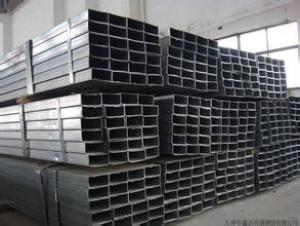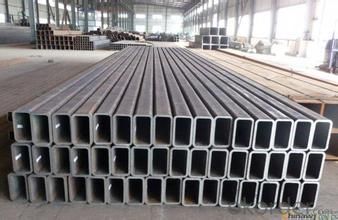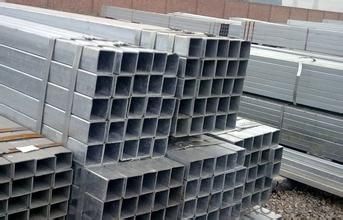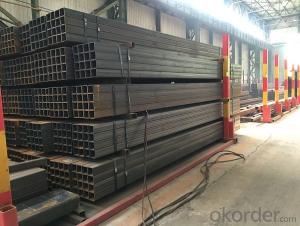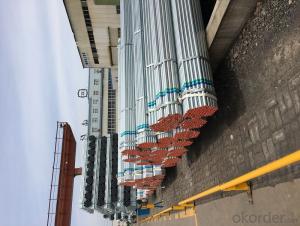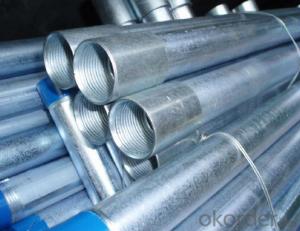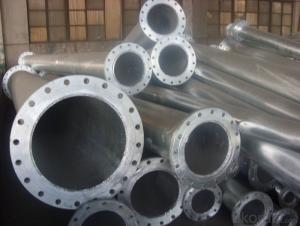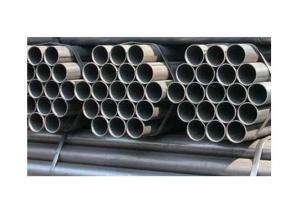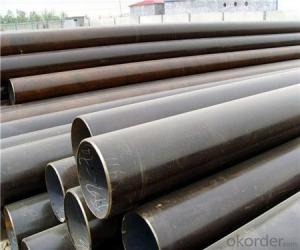Galvanized Square Pipe With Hot Structure
- Loading Port:
- China main port
- Payment Terms:
- TT or LC
- Min Order Qty:
- 10 m.t.
- Supply Capability:
- 3000 m.t./month
OKorder Service Pledge
OKorder Financial Service
You Might Also Like
Quick Details
Standard: BS, JIS, GB
Standard: BS 1387, BS EN10296, JIS G3463-2006, JIS G3459-2004, JIS G3461-2005, GB 13296-2007, GB/T 12770-2002, GB/T 13793-1992, GB/T 14976-2002, GB/T 14975-2002, GB/T 3093-2002
Grade: Q195-Q345
Grade: Q235, Q195, Q215
Thickness: 0.3 - 13 mm
Section Shape: Square
Outer Diameter: 10mm*10mm~50mm*50mm
Place of Origin: China
Secondary Or Not: Non-secondary
Application: Structure Pipe
Technique: ERW
Certification: BV
Surface Treatment: oiled
Alloy Or Not: Non-alloy
Brand name: SINCERE
Type: Welded
Welded line type: Longitudinal
Length: Any length
Packaging & Delivery
Packaging Details:
By bundles tightened with 7 metal belt and the plastic should be wrapped or not or according to customers' requirement.
Delivery Detail:
According to your order, usually within 15 days.
FAQ of Rectangular Steel Tube
①How is the quality of your products?
Our products are manufactured strictly according to national and internaional standard, and we take a test
on every pipe before delivered out. If you want see our quality certifications and all kinds of testing report, please just ask us for it.
Guaranteed: If products’ quality don’t accord to discription as we give or the promise before you place order, we promise 100% refund.
②How about price?
Yes, we are factory and be able to give you lowest price below market one, and we have a policy that “ for saving time and absolutely honest business attitude, we quote as lowest as possible for any customer, and discount can be given according to quantity”,if you like bargain and factory price is not low enough as you think, just don’t waste your time.Please trust the quotation we would give you, it is professional one.
③Why should you chose us?
Chose happens because of quality, then price, We can give you both.Additionally, we can also offer professional products inquiry, products knowledge train(for agents), smooth goods delivery, exellent customer solution proposals.Our service formula: good quality+good price+good service=customer’s trust
SGS test is available, customer inspection before shipping is welcome, third party inspection is no problem.
If you have any question, pls feel free to contact us !
Rectangular Hot Rolled Steel Tube Image
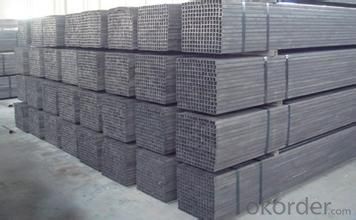
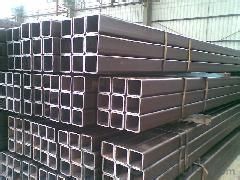
- Q: What time what time for gas pipeline steel pipe PE pipe
- City network is generally medium, are generally. PE pipe high pressure pipe with building the required distance, is generally used around the high pressure pipe laying (high pressure gas supply capacity, and can play the role of peak shaving), the city zone by the supply voltage to the voltage, residential building regulation boxes of low voltage supply to the users.
- Q: How are steel pipes used in irrigation systems?
- Steel pipes are commonly used in irrigation systems to transport water from a water source, such as a well or a reservoir, to the fields or plants that need to be irrigated. These pipes are durable, strong, and resistant to corrosion, making them ideal for withstanding the constant flow of water and the harsh outdoor conditions. They are typically laid underground or above the surface, depending on the specific irrigation system design, and are connected to sprinklers or drip irrigation systems to distribute water efficiently and effectively to the crops or plants.
- Q: What are the different end types for steel pipes?
- Steel pipes can have various end types, each designed for a specific purpose. Some common end types include: 1. Plain End: This is the simplest type, with no threading or special treatment. It is used for non-threaded applications or when welding is required. 2. Threaded End: These ends have male threads on one or both sides, allowing for easy connection with other threaded fittings or pipes. They are commonly used in plumbing and gas applications that require easy assembly and disassembly. 3. Beveled End: Beveled ends are cut at an angle (usually 30 or 45 degrees) to facilitate welding. The smooth transition between the pipe and the weld joint ensures a strong connection. They are used in construction, oil and gas, and pipeline industries. 4. Coupling End: These ends have female threads on both sides, enabling the joining of two pipes with a coupling or fitting. They are often used in plumbing systems or for easily disassembling pipe sections. 5. Flanged End: Flanged ends have a flared or raised lip on one or both sides, allowing for easy attachment to other flanged components like valves or pumps. They are commonly used in industrial applications requiring secure connections. 6. Socket Weld End: These ends have a socket or recess on one or both sides, allowing for easy connection with socket weld fittings. They provide a strong joint and are commonly used in high-pressure applications, such as petrochemical or power plants. These examples demonstrate the variety of end types available for steel pipes. The choice depends on specific application requirements, including the need for easy assembly, disassembly, or compatibility with other fittings.
- Q: How are steel pipes protected against chemical corrosion?
- Steel pipes are protected against chemical corrosion through various methods such as coating them with corrosion-resistant materials like epoxy or polyethylene. Additionally, cathodic protection techniques like applying sacrificial anodes or using impressed current systems can also be employed to prevent chemical corrosion on steel pipes.
- Q: What are the factors to consider when selecting steel pipes for a specific application?
- When selecting steel pipes for a specific application, several factors need to be considered. The key factors include the required strength and durability, corrosion resistance, temperature and pressure requirements, size and dimensions, cost considerations, and compatibility with other materials or systems. Additionally, factors such as the intended environment, installation requirements, and regulatory compliance should also be taken into account to ensure the optimal selection of steel pipes for the particular application.
- Q: What is the process of coating steel pipes?
- The process of coating steel pipes involves applying a protective layer on the surface of the pipe to prevent corrosion and increase its durability. This typically includes cleaning the pipe to remove any contaminants, followed by applying a primer to improve adhesion. The pipe is then coated with a layer of paint or a specialized coating material using a variety of techniques such as spraying, dipping, or electrostatic application. The coated pipe is then cured or dried to ensure the coating adheres properly. This process helps to ensure the longevity and performance of steel pipes in various applications.
- Q: How are steel pipes coated to prevent external corrosion?
- Steel pipes are commonly coated to prevent external corrosion through various methods such as applying a layer of protective paint, using epoxy or polyethylene coatings, or galvanizing the pipes by applying a zinc layer. These coatings act as barriers against moisture and other corrosive elements, ensuring the longevity and durability of the steel pipes.
- Q: How are steel pipes protected against microbial corrosion?
- Steel pipes are protected against microbial corrosion through various methods, such as applying protective coatings or linings on the pipes' inner and outer surfaces. These coatings act as a barrier, preventing the contact of microorganisms with the steel surface, thereby reducing the risk of microbial corrosion. Additionally, biocides and inhibitors can be added to the pipe's contents or injected into the pipeline to inhibit the growth and activity of microbes, further protecting the steel pipes from microbial corrosion.
- Q: What is lined pipe?
- Is the coating of the inside of the pipe, such as pipe conveying sulfuric acid will corrode, corrosion, but soft plastic pipe, buried in the ground to wall thicker, then you can use the liner and characteristics of hard for using steel pipe laying, sheathed in the steel pipe into the thin plastic tube, it can transport the sulfuric acid,
- Q: Are steel pipes suitable for food processing facilities?
- Yes, steel pipes are suitable for food processing facilities. Steel is a durable and hygienic material that is resistant to corrosion, making it ideal for transporting food products and maintaining their quality and safety. Additionally, steel pipes are easy to clean and disinfect, further ensuring sanitation standards in food processing facilities.
Send your message to us
Galvanized Square Pipe With Hot Structure
- Loading Port:
- China main port
- Payment Terms:
- TT or LC
- Min Order Qty:
- 10 m.t.
- Supply Capability:
- 3000 m.t./month
OKorder Service Pledge
OKorder Financial Service
Similar products
Hot products
Hot Searches
Related keywords
